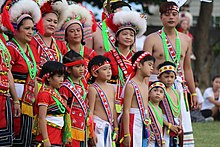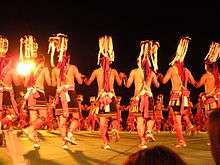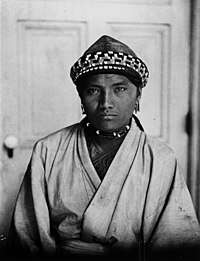Amis people
The Amis (Amis: Amis, Ami or Pangcah; Chinese: 阿美族; pinyin: āměi zú) are an Austronesian ethnic group native to Taiwan. They speak Amis, an Austronesian language, and are one of the sixteen officially recognized groups of Taiwanese aborigines. The traditional territory of the Amis includes the long, narrow valley between the Central Mountains and the Coastal Mountains (Huatung Valley), the Pacific coastal plain eastern to the Coastal Mountains and the Hengchun Peninsula.
 | |
| Total population | |
|---|---|
| 200,604 (2014) | |
| Regions with significant populations | |
| Taiwan | |
| Languages | |
| Amis, Mandarin | |
| Religion | |
| Animism, Christianity | |
| Related ethnic groups | |
| Sakizaya, Taiwanese Aborigines |
In 2014, the Amis numbered 200,604.[1] This was approximately 37.1% of Taiwan's total indigenous population, making them the largest indigenous group.[2] The Amis are primarily fishermen due to their coastal location. They traditionally have a matrilineal kinship system, by which inheritance and property pass through the maternal line, and children are considered born to the mother's people.[3]
Traditional Amis villages were relatively large for indigenous communities, typically holding between 500 and 1,000 people. In today's Taiwan, the Amis also comprise the majority of "urban aboriginals" and have developed many urban communities all around the island. In recent decades, Amis have also married exogamously to the Han as well as other indigenous peoples.[4]
Identity and classification
The Amis people generally identify as Pangcah, which means "human" or "people of our kind." But in 21st-century Taiwan, the term Amis is much more frequently used. This name comes from the word amis, meaning "north." There is still no consensus in the academic circle as to how "Amis" came to be used to address the Pangcah. It may originally have been a term used by the Puyuma to refer to the Pangcah, who lived to the north of them. Another theory is that those who lived in the Taitung Plain called themselves "Amis" because their ancestors had come from the north. This later explanation is recorded in the Banzoku Chōsa Hōkokusho,[5] indicating this term may have originated from a group classified by anthropologists as Falangaw Amis, the Amis group occupying territory from today's Chengkung to the Taitung Plain. Their closest genetic relatives appear to be the Filipino people.[6][7]
According to Taiwanese Aboriginal History: Amis, the Amis are classified into five groups:
- Northern group (located on the Chihlai/Hualien Plain)
- Middle group (located west to the Coastal Mountains)
- Coastal group (located east to the Coastal Mountains)
- Falangaw group (located Chenggong and the Taitung Plain)
- Hengchun group (located on the Hengchun Peninsula)
Such classification, however widely accepted, is based simply on the geographical distribution and ethnic migration. It does not correspond to observed differences in culture, language, and physiques.
Traditions

Family affairs, including finance of the family, are decided by the female householder, in the Amis tradition. The most important traditional ceremony is the Harvest Festival. The Amis Harvest festival is held to express the people's thanks and appreciation to the gods, and to pray for harvest in the next coming year. It takes place every July to September.[8]
Representation in media
The musical project Enigma used an Amis chant in their song "Return to Innocence," on their second album, The Cross of Changes (1993). This song was used as the theme song of the 1996 Atlanta Olympics. The main chorus was sung by Difang (Chinese name Kuo Ying-nan) and his wife, Igay (Chinese name Kuo Hsiu-chu), who were part of a Taiwanese aboriginal cultural performance group.
Maison des Cultures du Monde had earlier recorded the singing of this group while on tour, and released a CD. This song was subsequently used by Enigma (although they did not note the ethnic origin of the song and the singers). The recording studio and the Taiwanese group filed a suit for copyright infringement, which was later settled by Enigma out of court. Ami singing is known for its complex contrapuntal polyphony.
Notable Amis people

- A-Lin, singer, songwriter
- Ngayaw Ake, baseball player
- Yu Chang, baseball player
- Lin Chih-chieh, basketball player
- Chen Chih-yuan, baseball player
- Yang Chuan-kwang, Olympic decathlete
- Kuo Dai-chi, baseball player
- Mayaw Dongi, Minister of Council of Indigenous Peoples (2013–2016)
- Difang and Igay Duana, husband-and-wife folk music duo
- Van Fan, singer, actor
- Ehlo Huang, actor and member of pop group 183 Club
- Jam Hsiao, singer
- Kuo Hsing-chun, Olympic weightlifter
- Ilid Kaolo, singer and songwriter
- Ayal Komod, singer
- Tseng Li-cheng, 2012 Olympics Taekwondo bronze medalist
- Show Lo, singer, actor, host
- Lin Man-ting, football and futsal player
- Ati Masaw, baseball player
- Teruo Nakamura, Taiwan-born soldier of the Imperial Japanese Army and the last Japanese holdout soldier of World War II
- Kawlo Iyun Pacidal, member of Legislative Yuan
- Icyang Parod, Minister of Council of Indigenous Peoples
- Yang Sen, baseball player
- Sufin Siluko, member of Legislative Yuan
- Suming, actor, singer, songwriter. His music features elements from traditional Amis culture. Founder of the Amis Music Festival.
- Li Tai-hsiang, composer and folk songwriter[9]
- Tank, singer
- Tseng Te-Ping, singer
- Chin-hui Tsao, baseball player
- Dai-Kang Yang, baseball player
- Wei-Chung Wang, baseball player
- Huang Weijin, singer, actor, host
See also
- Demographics of Taiwan
- Taiwanese aborigines
- Amis Folk Center
- Kawas (mythology)
References
| Taiwanese indigenous peoples |
|---|
 |
| Peoples |
|
Nationally Recognized
Locally recognized Unrecognized |
| Related topics |
- Chia-chen, Hsieh; Wu, Jeffrey (15 February 2015). "Amis remains Taiwan's biggest aboriginal tribe at 37.1% of total". FocusTaiwan.tw. The Central News Agency. Retrieved 30 April 2015.
- "Table 28: Indigenous population distribution in Taiwan-Fukien Area", National Statistics, Republic of China, Taiwan: Directorate General of Budget, Accounting and Statistics, Executive Yuan (DGBAS), archived from the original on 2007-03-12, retrieved 2006-08-30.
- "Ami", Ethnologue.
- Olson, James Stuart, An Ethnohistorical Dictionary of China, Google.
- "Survey Reports on the Savages", Banzoku Chōsa Hōkokusho 蕃族調査報告書, 8, Taihoku (Taipei), 1913–1918, p. 4.
- plbi-03-08-05 1..11 (PDF), PLOS journals.
- HPGL (PDF), 64, Stanford, 2001, p. 432, archived from the original (PDF) on 2010-02-14.
- Amis Harvest Festival held in East Taiwan, The China Post, July 28, 2005, retrieved in April 8, 2011
- "Li Tai-hsiang, composer of Olive Tree and other hits, dies at age 72". Strait Times. 2014-01-03. Archived from the original on 2014-01-05. Retrieved 2014-02-03.
- Hsu et al., Taiwanese Aboriginal History: Amis, Taipei: 2001. ISBN 957-02-8013-1 and ISBN 957-02-8003-4. (Chinese language)
External links
| Wikimedia Commons has media related to Amis people. |
- Taiwanese government page on the Amis
- Amis Festivals
- Website dedicated to a documentary shot in the Amis village of Tafalong (Taiwan East Coast)
- Shamanic Healing among the Amis and Contemporary Christian Healing in the Spirit